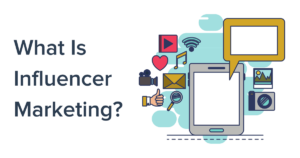What is influencer marketing?

Influencer marketing is a type of marketing that focuses on using key leaders to drive your brand’s message to the larger market. Rather than marketing directly to a large group of consumers, you instead inspire / hire/pay influencers to get out the word for you.
Influencer marketing often goes hand-in-hand with two other forms of marketing: social-media marketing and content marketing. Most influencer campaigns have some sort of social-media component, whereby influencers are expected to spread the word through their personal social channels. Many influencer campaigns also carry a content element in which either you create content for the influencers, or they create the content themselves. Though social media and content marketing often fit inside influencer campaigns, they are not synonymous with influencer marketing.
WHAT’S THE DIFFERENCE BETWEEN WORD-OF-MOUTH MARKETING AND INFLUENCER MARKETING?
Although some people use word-of-mouth marketing and influencer marketing interchangeably, there’s a real difference between the two disciplines. Whereas influencer marketing is the concept of engaging key individuals to leverage their influence among friends and family, word-of-mouth marketing is the actual avenue by which this communication takes place. So, almost all influencer marketing includes word-of-mouth marketing activities by its nature, but not all word-of-mouth marketing is driven by influencer campaigns.
Why is influencer marketing important??
The influence economy has changed the way we buy things—forever. Roughly 67 percent of marketers report that they are engaged in some form of influencer marketing, a number that’s likely to grow as social media influencers gain more mainstream exposure. With demand on the rise, the influencer economy is shifting toward more streamlined solutions, embracing tools like influencer networks, match-making platforms services and even programmatic to help brands tap influencers more easily. Brands who aren’t part of it are losing control. Consumers now control the buyer’s journey, and they are getting harder to reach with digital advertising:
- 90% of Americans ignore digital ads – Harris Interactive, 2015
- 40% of ad revenue lost to ad-block by sites that target millennials – President of IAB
- $7.2B estimated global losses to bot fraud in 2016 – White Ops/ANA, 2016
- 56% of paid-for digital ad impressions are never seen -Google, 2015
- 62% of consumers trust brands less -DoubleClick, 2015
Conventional digital marketing no longer works. A huge 66 percent of customers are overwhelmed by too many online marketing messages, and 20 percent of consumers would boycott a brand because of excessive ads. Marketers should care about influencer content because it provides the perfect cure for “ad fatigue” and, unlike traditional ad campaigns, delivers authenticity.
Smart brands are combating this by using influencer marketing to create an ongoing conversation with consumers, recognizing that they are influenced by different people, at different times, in different ways. Instead of diminishing returns from digital advertising, brand social and content marketing, the influencer marketing goes past reach and clicks to continuous engagement and conversations that drive commerce, giving you metrics that matter and align with your business goals, such as:
- Attracting new customers
- Increasing repeat purchases
- Driving customer loyalty
- Maximizing customer lifetime revenue
Consumers want authentic voices, not faceless sales executives who use the same old tricks. Marketers can’t ignore influencer marketing any longer: content creators have the power to drive business growth and deliver authenticity that engages with audiences. Imagine—thousands of voices having authentic conversations about your brand that hold sway in a way your voice alone never could. That’s the power of influencer marketing.
0 Comments